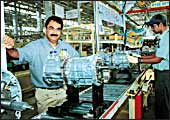 |
| TOYOTA'S INDIA HUB: (Left) Vikram Kirloskar,
Vice Chairman, TKAP, at Toyota-Kirloskar's auto comp plant near
Bangalore |
Abban Kuppe Meleruva
Suryana Kanalu
Namma Karayagara Vamananthe Kiriya E Dina
Aadre Aaguvudu Vishwadalli Hiriya
Hutti Baraya Kannada Nelladalli Hutti Baraaya
Every
morning at the crack of dawn 400 workers in Abban Kuppe, Bidadi,
a sleepy village 40 km from the heart of Bangalore off the Bangalore-Mysore
highway, break into the above song (of which only a verse has been
reproduced), which is in the local dialect, Kannada. No, this isn't
a village choral group giving its vocal cords a workout. Rather,
these are the workers of Toyota Kirloskar Auto Parts (abbreviated
TKAP, and pronounced Tee Cap), the components operations of the
Japanese auto giant. The song has been written by Kiyomichi Ito,
the 54-year-old soft-spoken Managing Director of TKAP, and translated
into the local language. It extols how the Abban Kuppe plant will
become a giant in the auto world and exhorts workers to collectively
strive towards this goal.
TKAP is 64 per cent owned by Toyota Motor Corporation
(which makes the Qualis, Corolla and Camry for the Indian market),
26 per cent is held by Toyota Industries and 10 per cent by Vice
Chairman Vikram Kirloskar. The 520 acres (including the 50-acre
campus of TKAP) that Toyota calls home houses a hi-tech unit in
the midst of rolling paddy fields. From here Toyota is planning
to make India its hub for manual transmissions, exporting it to
asean, South America and African markets.
|
JAPANESE JAUNT
|
»
Invested Rs 370 crore to make 160,000 transmission
gearboxes
» Will
export roughly Rs 400 crore of these systems in first year
» Indian
vendors have supplied 70 per cent of machines at TKAP
» Toyota
Motor has increased production by 30 per cent with just a 5
per cent step-up in investments
» TKAP
initially planned on being just an assembler; today is a production
hub |
TKAP will manufacture R type manual transmissions,
which will go into a new integrated multi-purpose vehicle that Toyota
is set to roll out shortly to replace the older Kijang. TKAP has
invested Rs 370 crore in the new plant and commercial production
started from May 31, 2004. The plant has a capacity of turning out
1,60,000 of these transmission gearboxes. TKAP expects to export
some Rs 400 crore worth of these systems.
For a company that was initially planning on
just assembling, and not manufacturing, making India a production
hub is indeed remarkable. The only other factory where Toyota manufactures
R type manual transmissions is in Japan. Toyota is inevitably implementing
its Kaizen (continuous improvement model) practices here. Kirloskar
points out that Toyota Motor Corp has been able to increase capacity
in India by 30 per cent with an additional investment of just 5
per cent.
It's not all hunky-dory-the Japanese aren't
too thrilled by the quality of infrastructure. For instance, it
takes Toyota workers 90 minutes to cover the 40 km distance between
Bangalore and the plant. Ito zeroes in on the cultural divide. ''When
an Indian says 'No Problem' it does not necessarily mean there is
no problem. He might have said that just to please his superior,''
he laughs. Perhaps it's time for Ito to add some new verses to his
favourite song.
|
